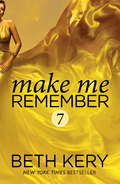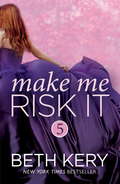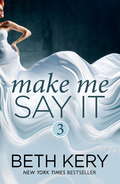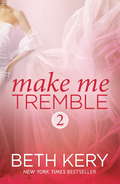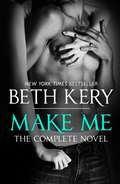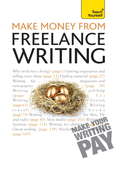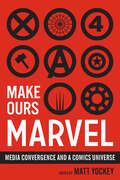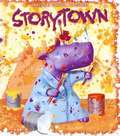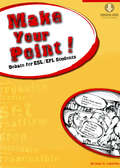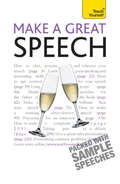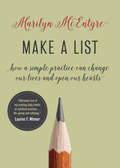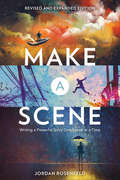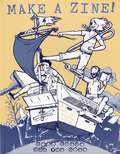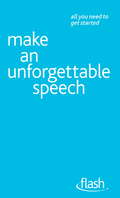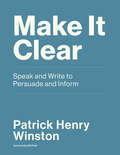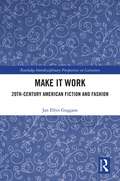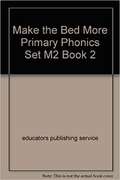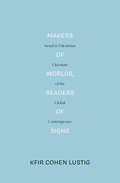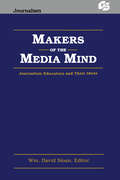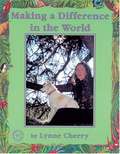- Table View
- List View
Make Me Remember (Make Me)
by Beth KeryFrom the New York Times bestselling author of Because You Are Mine and The Affair, comes Make Me - a tantalizing serial novel about hidden pasts, dangerous obsessions, and uncontrollable passion, perfect for fans of E. L. James, Sylvia Day, Jodi Ellen Malpas and J. Kenner. During sun-drenched, passionate days spent on Jacob's yacht, Harper and Jacob fall deeper in love, taking risks not only with their bodies but their hearts. The only thing standing between Jacob and pure bliss is the suspicion that Harper's memories are returning. If they do, she may never see him the same way again - or let him keep her safe from the horror that she faced as a young girl...The sense of security and trust Harper feels with Jacob has her finally abandoning herself to sensual decadence along with the truth that she's hopelessly in love with this dark, daring man. With her submission to her feelings, sad memories and dreams begin to rise to the surface of her consciousness-and hers isn't the only past being unburied. When one of her reporters reveals a startling revelation about Jacob's history, their shared experiences crash together in a way that will change her forever.Don't miss the jaw-dropping conclusion in Make Me Forever...Includes a bonus excerpt of Beth Kery's Wicked Burn.Discover the other captivating titles by Beth Kery: The Affair, the One Night of Passion series, and her bestselling erotically charged series which began with Because You Are Mine.
Make Me Risk It (Make Me)
by Beth KeryFrom the New York Times bestselling author of Because You Are Mine and The Affair, comes Make Me - a tantalizing serial novel about hidden pasts, dangerous obsessions, and uncontrollable passion, perfect for fans of E. L. James, Sylvia Day, Jodi Ellen Malpas and J. Kenner. Harper has had more than her fair share of bad luck with men. Although Jacob treats her royally and she can't resist his challenging sexual demands, his secretive nature makes her worry that he's just like all the rest. When a romantic trip to San Francisco gives her a glimpse into his past, Harper's distrust of powerful men kicks into overdrive. Between his questionable business activities, which Harper's paper wants to expose, and his secretive relationship with another woman, Harper wonders if his intentions are truly noble...Unable to get her out of his head, Jacob takes the risk of exposing part of his painful past to Harper. Even though his fascination with her could be his downfall, Jacob willing to do anything to bind her even closer to him...Don't miss the next instalment, Make Me Feel...Includes a bonus excerpt of Beth Kery's When I'm With You.Discover the other captivating titles by Beth Kery: The Affair, the One Night of Passion series, and her bestselling erotically charged series which began with Because You Are Mine.
Make Me Say It (Make Me)
by Beth KeryFrom the New York Times bestselling author of Because You Are Mine and The Affair, comes Make Me - a tantalizing serial novel about hidden pasts, dangerous obsessions, and uncontrollable passion, perfect for fans of E. L. James, Sylvia Day, Jodi Ellen Malpas and J. Kenner. Even as Jacob offers Harper a life of luxury and indulgence that thrills all her senses, she grows wary of this powerful man and his unquenchable desires. In their most intimate moments, Harper can't help but submit to his seductive demands. But the man outside the bedroom, whose early business dealings carry an air of questionable origins, who refuses to share even the smallest detail about his past, is an entirely different story...Jacob worries that, deep inside, Harper must recognize who he really is - the boy he was before he became a powerful, billionaire mogul. As much as he craves acknowledgment of their shared past, he dreads she might call him out as a fraud and leave his life forever...Don't miss the next instalment, Make Me Desperate...Includes a bonus excerpt of Beth Kery's The Affair.Discover the other captivating titles by Beth Kery: The Affair, the One Night of Passion series, and her bestselling erotically charged series which began with Because You Are Mine.
Make Me Tremble (Make Me)
by Beth KeryFrom the New York Times bestselling author of Because You Are Mine and The Affair, comes Make Me - a tantalizing serial novel about hidden pasts, dangerous obsessions, and uncontrollable passion, perfect for fans of E. L. James, Sylvia Day, Jodi Ellen Malpas and J. Kenner. When Jacob Latimer ran into Harper McFadden on the beach, she thought it was the first time their paths had crossed. Only Jacob knows that his murky history connects with hers in ways she couldn't imagine - ways that make their relationship dangerous. He should let her go. But now that he's felt her in his arms, he worries that he'll never be able to forsake her... Harper has never been this attracted to anyone before - nor has she ever been so intimidated. Jacob can go from aloof and mysterious to total mastery of her mind and body in a second flat. In the glamorous setting of his luxurious yacht, he finally stakes his claim. And he won't stop until he has every inch of her under his delicious control...Don't miss the next instalment, Make Me Say It...Includes a bonus excerpt of Beth Kery's Glow.Discover the other captivating titles by Beth Kery: The Affair, the One Night of Passion series, and her bestselling erotically charged series which began with Because You Are Mine.
Make Me: Complete Novel (Make Me)
by Beth KeryFor fans of E. L. James, Sylvia Day, Jodi Ellen Malpas, J. Kenner and Maya Banks. From the New York Times bestselling author of The Affair and the Because You Are Mine series, Make Me explores hidden pasts, dangerous obsessions, and uncontrollable passion... Harper McFadden established herself as an investigative journalist by being both compassionate and fearless. After tragedy strikes her family, she moves to the shores of Lake Tahoe to find some peace. But when mysterious software mogul Jacob Latimer enters her life, her thoughts turn from her own healing to an insatiable desire to get closer to him...No one knows what secrets lurk in the past of Jacob Latimer. He built his corporation from nothing, but rumors abound about his mysterious rise to power. Harper is the last person he should let into his life. She could expose the truth about his origins. But Jacob knows things about Harper's past that draw him in. He wants nothing more than to make her his - and Jacob is a man who always gets what he wants...For more electrifying romance, don't miss the other captivating titles by Beth Kery, The Affair, Glimmer, Glow, the One Night of Passion series, and her bestselling erotically charged series which began with Because You Are Mine.
Make Money From Freelance Writing: Learn how to make a living from your interest in creative writing
by Claire GillmanMake Money From Freelance Writing takes you step by step through every avenue for making an income from professional writing. Covering everything from travel writing to writing self-help features and full-length book commissions, it also includes writing for new media and the practicalities of finding a route to market/self-publicity. Each chapter contains a diagnostic test, case studies, practical exercises and Aide Memoire boxes. Each chapter concludes with a reminder of the key points of the chapter (Focus Points) and a round-up of what to expect in the next (Next Step) will whet your appetite for what's coming and how it relates to what you've just read.
Make Money From Freelance Writing: Teach Yourself
by Claire GillmanMake Money From Freelance Writing takes you step by step through every avenue for making an income from professional writing. Covering everything from travel writing to writing self-help features and full-length book commissions, it also includes writing for new media and the practicalities of finding a route to market/self-publicity. Each chapter contains a diagnostic test, case studies, practical exercises and Aide Memoire boxes. Each chapter concludes with a reminder of the key points of the chapter (Focus Points) and a round-up of what to expect in the next (Next Step) will whet your appetite for what's coming and how it relates to what you've just read.
Make Ours Marvel: Media Convergence and a Comics Universe (World Comics And Graphic Nonfiction Ser.)
by Matt YockeyThe creation of the Fantastic Four effectively launched the Marvel Comics brand in 1961. Within ten years, the introduction (or reintroduction) of characters such as Spider-Man, the Hulk, Iron Man, Captain America, and the X-Men catapulted Marvel past its primary rival, DC Comics, for domination of the comic book market. Since the 2000s, the company&’s iconic characters have leaped from page to screens with the creation of the Marvel Cinematic Universe, which includes everything from live-action film franchises of Iron Man and the Avengers to television and streaming media, including the critically acclaimed Netflix series Daredevil and Jessica Jones. Marvel, now owned by Disney, has clearly found the key to transmedia success. Make Ours Marvel traces the rise of the Marvel brand and its transformation into a transmedia empire over the past fifty years. A dozen original essays range across topics such as how Marvel expanded the notion of an all-star team book with The Avengers, which provided a roadmap for the later films, to the company&’s attempts to create lasting female characters and readerships, to its regular endeavors to reinvigorate its brand while still maintaining the stability that fans crave. Demonstrating that the secret to Marvel&’s success comes from adeptly crossing media boundaries while inviting its audience to participate in creating Marvel&’s narrative universe, this book shows why the company and its characters will continue to influence storytelling and transmedia empire building for the foreseeable future.
Make Your Point!: Debate For Esl/efl Students
by Michael H. LubetskyThis valuable workbook and downloadable audio can turn any ESL student into an accomplished debater! Make Your Point! opens the world of formal debate to the English learner. Debate fundamentals are taught form the first chapter in a student-centered format suitable for large and small classes alike. Each of the ten chapters offers a "language focus" and a "debatable focus. " As students learn new debate skills, they also build important language skills. All task chains integrate speaking, listening, reading and writing activities. Most activities are intended for pairs and small groups. Neither the learners nor the teacher needs any prior debate experience to use this text successfully. This debate course promotes other forms of oral communication—such as discussion, recitation and speech-making—as well as more general activities, such as summarizing and taking notes.
Make Your Writing Flow: A Practical Guide to Transitional Words and Phrases
by Ryan Deane<p>Take Your Writing To The Next Level With This Invaluable Reference Tool! <p>For many aspiring writers, one of the biggest obstacles they face is the ability to write flowing sentences and paragraphs. How many times have you read a piece of writing and felt jarred by a poorly constructed passage? Trust me, you're not alone. <p>The talent to string thoughts and ideas together in a way that's pleasing to a reader is what separates an amateur writer from a professional. Fortunately, this skill can be taught, and is the subject of this book. <p>Ryan Deane has compiled a transitional words and phrases reference unlike anything ever published. This book is filled to the brim with words and phrases to help you build compelling sentences and paragraphs that will keep your readers thoroughly engaged.</p>
Make a Great Speech: Teach Yourself (Teach Yourself General)
by Jackie ArnoldWritten by a professional toastmaster, keynote speaker and voice coach, this book gives you all you need to make an effective speech on any occasion. From weddings and christenings to fundraising events and after-dinner speeches, it offers suitable material for any occasion, with practical techniques and strategies for everything from using props to conquering stage fright and banishing your butterflies forever. Teach Yourself - the world's leading learning brand - is relaunched in 2010 as a multi-platform experience that will keep you motivated to achieve your goals. Let our expert author guide you through this brand new edition, with personal insights, tips, energising self-tests and summaries throughout the book. Go online at www.teachyourself.com for tests, extension articles and a vibrant community of like-minded learners. And if you don't have much time, don't worry - every book gives you 1, 5 and 10-minute bites of learning to get you started. - Gives you a comprehensive source of advice, material and techniques for wedding speeches - Offers hints on how to speak effectively and conquer your butterflies - Features practical guides to making the most of props and technology
Make a List: How a Simple Practice Can Change Our Lives and Open Our Hearts
by Marilyn McEntyreWhat if writing a list could literally change your life?From the ancient book of Numbers to the latest clickbait listicle, list-writing has been a routine feature of human experience. Shopping lists. To-do lists. Guest lists. Bucket lists. Lists are everywhere you look.But what if our lists did more than just remind us to buy milk and take out the trash? What if the practice of list-making could help us discover who we truly are and even point us to our deepest joys, hopes, and desires?In Make a List teacher, writer, and wordsmith Marilyn McEntyre shows readers how the simple act of writing a list can open doors to personal discovery and spiritual growth. Deepening her reflections with abundant writing prompts and real-life examples, McEntyre turns the humble list into a work of art—one that has the power to clear minds, open hearts, and change lives.
Make a Scene Revised and Expanded Edition: Writing a Powerful Story One Scene at a Time
by Jordan RosenfeldThe definitive guide to writing scenes--now revised and expanded! Scenes are the building blocks for any work of fiction--the DNA sequence that makes a novel un-put-downable and unforgettable. When writers are able to craft effective, engaging scenes, they can develop a complete, cohesive story--and a mesmerizing experience for readers.Make a Scene Revised and Expanded Edition takes you step-by-step through the elements of strong scene construction and demonstrates how the essential aspects of a compelling story--including character, plot and dramatic tension--function within the framework of individual scenes to give momentum to the whole narrative. You'll learn how to:Craft an opening scene that hooks readers and foreshadows conflict.Develop various scene types--from contemplative to suspenseful to flashback--that are distinct and purposeful.Establish characters' intentions within a scene that drive the plot.Transition into new scenes by clearly establishing details of setting, character, and point of view.Create resonating climactic and final scenes that stay with readers long after they've finished your story.The revised and expanded edition includes brand-new examples, an increased focus on advancing plot and character development, and the same knowledge and clarity that writers have come to expect from Jordan Rosenfeld. Make a Scene is an essential part of any novelist's library--make sure it's in yours.
Make a Wish
by Judith KayIt was love at first sight when aspiring actors Abby Nicholson and Lucas Miller met at an audition in NewYork City. After just a few months, their romance seemed destined for marriage. But will their love survive when the demands of their careers and families get in the way? Genre: Romance Length: about 15,000 words Level: 4th grade
Make a Zine: When Words and Graphics Collide
by Joe BielIn Microcosm's DIY guide to zine-making, editors Bill Brent, Joe Biel, and a cast of contributors take you from the dreaming and scheming stages onto printing, publication and beyond! Covering all the bases for beginners, Make a Zine! hits on more advanced topics like Creative Commons licenses, legality, and sustainability.<P><P> Illustrated by an army of notable and soon-to-be-notable artists and cartoonists, Make a Zine! also takes a look at the burgeoning indie comix scene, with a solid and comprehensive chapter by punk illustrator Fly (Slug and Lettuce, Peops.) Part history lesson, part how-to guide, Make a Zine! is a call to arms, an ecstatic, positive rally cry in the face of TV show book clubs and bestsellers by celebrity chefs. As says Biel in the book's intro, "Let's go!"
Make an Unforgettable Speech: Flash
by Jackie ArnoldThe books in this bite-sized new series contain no complicated techniques or tricky materials, making them ideal for the busy, the time-pressured or the merely curious. Made An Unforgettable Speech is a short, simple and to-the-point guide to learning the basic principles of a great speech in a few short steps. Whether for a wedding, a presentation or just a special occasion, in just 96 pages you will discover how to master the essential ideas and deliver a captivating and memorable performance, helping you to make a lasting impression with no effort at all.
Make it Clear: Speak and Write to Persuade and Inform
by Patrick Henry WinstonThe essentials of communication for professionals, educators, students, and entrepreneurs, from organizing your thoughts to inspiring your audience and ensuring what you say is remembered.Do you give presentations at meetings? Do you ever have to explain a complicated subject to audiences unfamiliar with your field? Do you make pitches for ideas or products? Do you want to interest a lecture hall of restless students in subjects that you find fascinating? Then you need this book. Make It Clear explains how to communicate--how to speak and write to get your ideas across. Written by an MIT professor who taught his students these techniques for more than forty years, the book starts with the basics--finding your voice, organizing your ideas, making sure what you say is remembered, and receiving critiques ("do not ask for brutal honesty")--and goes on to cover such specifics as preparing slides, writing and rewriting, and even choosing a type family.
Make it Work: 20th Century American Fiction and Fashion (Routledge Interdisciplinary Perspectives on Literature)
by Jan Ellyn GoggansImagine a new critical theory that bases its literary value on fashion. In this theory exists a community that explores and interrogates conventionality, and in American literature of the 20th century, it includes fashion and home decoration, two paths to achieving white femininity, a prized component of many novels written by and for women. Drawing on cultural materialism and its connection to the cultural forms of objects, including apparel, Making it Work: 20th Century American Fiction and Fashion provides readers a new understanding of the aims of American writers, and the desires of their readers.
Makers of Worlds, Readers of Signs: Israeli and Palestinian Literature of the Global Contemporary
by Kfir CohenA sweeping new theory of world literature through a study of Palestinian and Israeli literature from the 1940s to the presentMakers of Worlds, Readers of Signs charts the aesthetic and political formation of neoliberalism and globalization in Israeli and Palestinian literature from the 1940s to the present. By tracking literature’s move from making worlds to reading signs, Cohen Lustig proposes a new way to read theorize our global contemporary. Cohen Lustig argues that the period of Israeli statism and its counterpart of Palestinian statelessness produced works that sought to make and create whole worlds and social time—create the new state of Israel, preserve collective visions of Palestinian statehood.During the period of neoliberalism, the period after 1985 in Israel and the 1993 Oslo Accords in Palestine, literature became about the reading of signs, where politics and history are now rearticulated through the private lives of individual subjects. Here characters do not make social time but live within it and inquire after its missing origin. Cohen Lustig argues for new ways to track the subjectivities and aesthetics produced by larger shifts in production. In so doing, he proposes a new model to understand the historical development of Israeli and Palestinian literature as well as world literature in our contemporary moment. With a preface from Fredric Jameson.
Makers of the Media Mind: Journalism Educators and their Ideas (Routledge Communication Series)
by Wm. David SloanMakers of the Media Mind is a collection of analytical essays focusing on the most important and original ideas contributed to the field of mass communication by journalism educators. Divided into six sections representing the most prominent areas of specialization in the field, this text serves two significant purposes: first, it acquaints readers with the lives of preeminent journalism educators; second, it provides concise discussions and evaluations of the most compelling ideas those educators have to offer. The editor of, and contributors to, this text contend that ideas cannot be appreciated fully without an understanding of the creators of those same ideas. They hope that this volume's coverage of "creators" as well as concepts will demonstrate that journalism education has played a critical role in the making of the "media mind."
Making A Difference in the World
by Lynne Cherry John Christopher FineA prominent children's book author and illustrator shares her life, her daily activities, her interest in environmental preservation, and her creative process, showing how all are intertwined.
